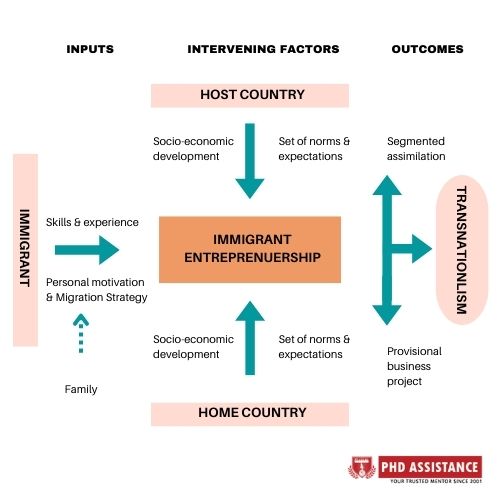Immigrant’s Potentials to Emerge as Entrepreneurs
Introduction
According to a researcher, immigrants are more likely to establish their own businesses than the ordinary person is because immigrants are more prepared to take chances because they are leaving their home nations to make a new life for themselves. Also Peter Vandor, a prominent researcher and lecturer of Economics and Business at Vienna University, “Because of self-selection, voluntary foreign migrants tend to be more entrepreneurial (Vandor, 2022)”.
In an article that was published in the Journal of World Business, Vandor demonstrates that the remarkable propensity of foreign immigrants to form businesses—often at a considerably greater rate than the native-born citizens of those countries—relies on their willingness to take reasonable risks (Singer, 2021).
According to recent statistics, immigrants in the US are nearly twice more likely to start their own business than Americans who were born abroad. More over 12 million of the 44.9 million immigrants living in the United States, or 13 percent of the entire population, are business owners. This demonstrates that immigrants not only have a higher likelihood of success, but are also more likely to take a chance in general.

Figure1: The theoretical framework for immigrant entrepreneurship
More Opportunities
In recent decades, immigrants have made tremendous increases in their entrepreneurial contributions to these industrialized countries. This shift is occurring for a number of reasons. This includes the fact that their abilities and skills are valued and acknowledged more widely abroad than they are at home. A meeting place for people from various cultural backgrounds and migrant origins, developed countries also provide as a strong foundation for globalised enterprises and communities (Huang & Liu, 2019). The number of migrants living thousands of miles from their homes has increased over the previous 20 years, from 173 million in 2000 to 281 million in 2020. Additionally, around one-fourth of all startups or technology companies founded in the United States or Canada had at least one immigrant founder.
The Evolving Consciousness
The primary factors of immigration have always been access to top-notch education, ease of doing business, state-of-the-art infrastructure, global mobility, and a higher standard of living. People have become more aware of the value of living in a safe and economically stable country as a result of the Covid-19 infection and the uncertainty it has caused (Shinnar & Zamantılı nayır, 2019).
The United States, the European Union, Canada, and the United Kingdom are among the most sought-after locations for immigrant entrepreneurs. Two-thirds of the world’s immigrants live in 20 nations, according to a recent research by the UN Department of Economic and Social Affairs.
Changing the Immigration scenario
Three essential routes are used by immigrant entrepreneurs seeking permanent residency in Canada: the Intra-Company Transfer (C-11) visa, the Canada Provincial Entrepreneur Visa, and the Canada Startup Visa.
The United States provides foreign nationals with an E-2 visa that enables them to invest and conduct business activities within the country. Even yet, it’s essential to remember that Indian nationals cannot immediately apply for the E-2 visa. To be eligible for the path, they must first complete an investment to become citizens of Grenada. The EB-5 Program also enables candidates to submit an investment-based US Green Card application.
The International Entrepreneur Parole (IEP) Program was launched by the current Biden administration, which is regarded as being more receptive to immigration than the Trump government. Through the Program, DHS will be able to use its parole authority to provide temporary visas to foreign business owners coming to the US to develop cutting-edge enterprises with promising prospects for employment creation (Brzozowski et al., 2019).
Similar to this, the EU Golden Visa Programs, which have only been in existence for a little more than ten years, are successful in luring foreigners looking to invest in Europe. Whether foreign nationals are only seeking for company expansion or already have a business idea, Europe Startups and Entrepreneur Visa programmes are having a huge impact on them.Furthermore, compared to other nations, Golden Visa schemes have a lower required minimum investment.
As more foreign businesspeople are permitted in the post-Brexit environment, the UK is also redefining the immigration process. In the future, it could offer more options to Indians looking to move to the UK.
Through investment initiatives like the Business Innovation and Investment Programme, the Global Talent Programme, and the Employer-Sponsored Programme, Australia is also drawing immigrant entrepreneurs.
Conclusion
Immigrant’s cross-cultural experience is one of the most persuasive explanations for these entrepreneurs’ success in developed countries. They can enhance competitive company ideas and find greater business possibilities thanks to it. They are able to provide new products, be more inventive, provide better services, and emphasize client preferences because of their diverse companies and cultural understanding. Additionally, the exposure enables them to effectively share their expertise of consumer difficulties. Similar characteristics are shared by many prosperous immigrant entrepreneurs.
PhD assistance provides the best dissertation writing help in business management and also assists scholars in academic research, research proposal and writing dissertations from scratch in different subject domains.
References
Assistance, P. 2021. Cross-cultural Capabilities of Immigrant Entrepreneurs.
Brzozowski, J., Cucculelli, M. & Surdej, A. 2019. Exploring transnational entrepreneurship. Immigrant entrepreneurs and foreign-born returnees in the Italian ICT sector. Journal of Small Business & Entrepreneurship. (31)5,. pp. 413–431.
Huang, X. & Liu, C.Y. 2019. Immigrant Entrepreneurship and Economic Development. Journal of the American Planning Association. (85)4,. pp. 564–584.
Shinnar, R.S. & Zamantılı nayır, D. 2019. Immigrant Entrepreneurship in an Emerging Economy: The Case of Turkey. Journal of Small Business Management. (57)2,. pp. 559–575.
Singer, C. 2021. Study Explains Why Immigrants Are More Likely To Become Entrepreneurs.
Vandor, P. 2022. Social Entrepreneurship Center.
 Previous Post
Previous Post Next Post
Next Post
